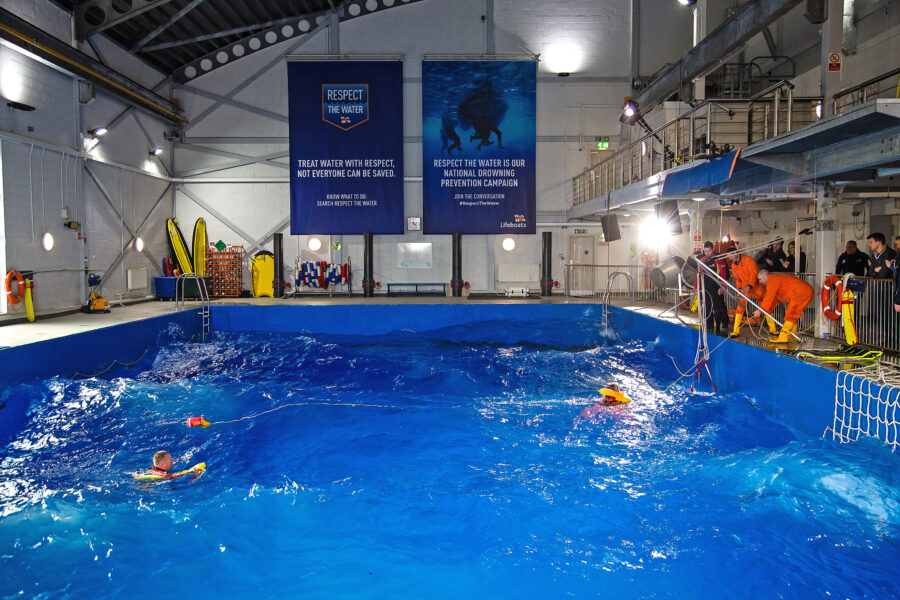The RNLI Fishing Safety Team recently held a two-day, cold water safety training event at the RNLI Survival Centre in Poole, Dorset.
The event was put together to find out if fishermen would change their safety culture if shown the effects of cold water on their bodies. The event was put together with the assistance of representatives from the fishing industry, MAIB, and Portsmouth University.
Sixteen fishermen from across the UK and Ireland took part in the event at the RNLI College, where a series of exercises were run in the lifesaving charity’s sea survival pool to improve survival techniques and recovery procedures.
Using the charity’s unique pool ensured the RNLI’s Fishing Safety team were able to create real-life sea conditions to ensure the fishermen were fully aware of the dangers and challenges of man overboard situations. The pool – which is used to train the charity’s volunteer lifeboat crew members – features realistic seawater temperatures and can replicate artificial waves, as well as simulating rain and wind conditions.
The event had two aims:
Day 1: Experience of personal survival in cold water without and with PFDs
Day 2: Experience of Man Overboard Recovery

Fraserburgh skipper John Stephen enters the survival pool
On the first day, fishermen from different parts of the UK and Ireland were given the chance to experience being put in a cold water survival pool with their normal fishing clothes, unaided by a Personal Floatation Device (PFD).
The fishermen entered the water and trod water for as long as possible, or until the safety swimmer called time on their efforts. This proved to be a lot harder than the fishermen expected, with some only lasting 25 seconds, and most only a few minutes.
Comments from the fishermen getting out of the water tended to mostly be on the effects the clothing had on their movements in the water, and that they made it much harder to swim and keep their head out of the water. This all took place in calm water at 16°C (approximately double the temperature of seawater in winter).

Recovering a MOB using more specialist equipment
The fishermen then re-entered the water wearing a PFD, and all was fine. They noticed the cold more this time as they had nothing to do but lie in the water and conserve body heat. All found using a PFD to be a less harrowing experience, and felt their survival time had greatly increased.
Then the wave machine in the specially-built survival pool was switched on, creating conditions equivalent to a force 3-4. The fishermen were still wearing a PFD and all their deck clothes, ie oilskins, boiler suits, jeans, hoodies, boots etc.
Experiencing wave effect provided a very different feeling for them. While the PFD keeps a man overboard up, it can’t do all the work. Any fisherman in the water has to quickly learn to position themselves in relation to the waves, must expect water on their faces, and be able to control their breathing.
It would be fair to say that most of the group forgot all of this, openly admitting this on their way out of the survival pool.
The cold, coupled with the waves and the clothing, made it very difficult for even the strongest swimmers among them, let alone the non-swimmers. RNLI safety training officers also tested the hand-grip strength of the fishermen before going in and afterwards. The results showed that most had lost around 40% to 50% of their ability to grip.

Tests indicated that hand-grip strength quickly dropped by around 50% due to immersion in cold water
All in all, the aim of the course was achieved, by providing firsthand experience that if fishermen end up in the sea unexpectedly without a PFD, survival times can be talked about in seconds, while with a PFD this becomes minutes.
Day two was devoted to enabling fishermen to gain first-hand experience of Man Overboard Recovery (MOB).
MAIB reports indicate that most MOB casualties become unable to help themselves after around 10 minutes in cold water. This means that they have to be recovered in less than that time, or recover themselves.
The team set the fishermen tasks involving getting out of the water using equipment and methods that fishermen said they could use on-board their vessels, eg tyres, strops, etc. Recovery attempts were first made in calm waters, then with the wave machine on.
All found it hard in calm water, but managed. Everything was more difficult with the waves on. Some attendees didn’t complete the tasks, even after some very brave attempts.
RNLI staff then rigged up some better versions of the same thing, ie two tyres tied together horizontally with a slip release in one end, so that when pulled the tyres would fall vertically, forming a step to climb out on. This made it, in their view, 50% easier to climb out, even with the waves on. All the activities were filmed for further use and will be on social media soon.
Frankie Horne, RNLI fishing safety manager, said:
“Every fisherman who participated in the two-day event gave the activities their very best efforts and returned to their boats determined to pass on the lessons learned and therefore to make a safer industry.
“The RNLI would like to thank Sean Friday (MAIB) for delivering a case study to the group, and Claire Eglin from Portsmouth University for delivering a presentation on the effects of cold water shock. Both were well received.”
The entire RNLI safety training course seems to have made an impact on the fisherman who took part and more events like this could only have a positive impact on UK and Ireland fishermen’s safety standards.
Read more from Fishing News here.








